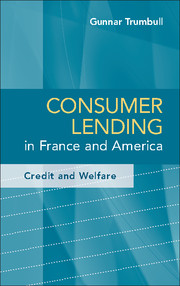Book contents
- Frontmatter
- Dedication
- Contents
- Figures and Tables
- 1 Introduction
- 2 Commercial Banks and Consumer Credit in the United States
- 3 Banks against Credit
- 4 American Retailers and Credit Innovation
- 5 Selling France on Credit
- 6 Credit and Reconstruction
- 7 The Politics of Usury
- 8 Credit for Being American
- 9 Deregulation and the Politics of Overindebtedness
- 10 Credit and Welfare
- Index
- References
9 - Deregulation and the Politics of Overindebtedness
Published online by Cambridge University Press: 05 August 2014
- Frontmatter
- Dedication
- Contents
- Figures and Tables
- 1 Introduction
- 2 Commercial Banks and Consumer Credit in the United States
- 3 Banks against Credit
- 4 American Retailers and Credit Innovation
- 5 Selling France on Credit
- 6 Credit and Reconstruction
- 7 The Politics of Usury
- 8 Credit for Being American
- 9 Deregulation and the Politics of Overindebtedness
- 10 Credit and Welfare
- Index
- References
Summary
The deregulation of France's financial sector in the early 1980s led to a boom in credit extension. Household indebtedness grew from 1984 to 1989, increasing from an average of 3 percent to 7 percent of disposable income per household. The share of houses with outstanding consumer debt increased from 39 percent to 53 percent. By the standards of the United States, these numbers were still small. Nonetheless, the growth in the use of credit led French policymakers to question the logic of consumer-credit extension. Some saw it as a positive sign – a democratization of credit that allowed households to behave more like companies. Lenders made the case that easier access to credit, and in particular to the new flexible forms of revolving credit, allowed households to behave in more “adult” ways. The dominant interpretation, however, was that consumer credit was being used in ways that would prove socially and economically disruptive.
What followed was a political backlash that was driven by a range of social and policy actors who worried that consumers were overindebted, and that the government should act to reduce their debt. Explanations for both the cause and the consequences of this overindebtedness (surendettement) differed. Some blamed the new revolving-credit accounts that had been popularized with Cetelem's launch of the Carte Aurore. Consumer finance companies accused banks of making loans without rigorous credit checks. Others blamed the lack of a central credit registry, allowing borrowers to approach multiple lenders for loans. Why exactly consumers would want to borrow so heavily was also up for dispute. Some applauded the fact that consumers were finally able to use credit without having to worry about the moral implications. Others argued that consumers were using credit to compensate for stagnant real wages, and that the appropriate response was higher wages, not more credit. From the American perspective, what is striking about these debates was the relatively low level of indebtedness at which they occurred. From liberalization in 1984 until a debate emerged about overindebtedness in 1988, household consumer indebtedness doubled; yet it had still only reached the level of indebtedness already experienced by American households in the early 1950s.
- Type
- Chapter
- Information
- Consumer Lending in France and AmericaCredit and Welfare, pp. 191 - 208Publisher: Cambridge University PressPrint publication year: 2014
References
- 1
- Cited by



